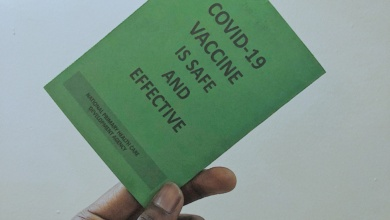#COVID19: G20 Countries Receive More Vaccines Than Sub-Saharan African Countries – Report
Based on the analysis conducted on G20 countries receiving excess vaccines, UNICEF African ambassadors and supporters united, calling on countries to deliver doses by December.

An analysis has shown that G20 countries have received 15 times more COVID-19 vaccine doses per capita than countries in sub-Saharan Africa.
In the analysis, the United Nations Children’s Fund (UNICEF) commented that this vaccine inequity is affecting African countries.
The analysis conducted by science analytics company, Airfinity, shows the severity of vaccine inequity between high-income and low-income countries, especially in Africa.
It found that doses delivered to G20 countries per capita are 15 times higher than doses delivered per capita to sub-Saharan African countries, 15 times higher than doses delivered per capita to low-income countries, and three times higher than doses delivered per capita in all other countries combined.
The members of the G20 which are Argentina, Australia, Brazil, Canada, China, France, Germany, India, Indonesia, Italy, Japan, Republic of Korea, Mexico, Russia, Saudi Arabia, South Africa, Turkey, the United Kingdom, the United States, and the European Union in the analysis have received excess vaccine dose.
Henrietta Fore, UNICEF Executive Director, remarked that vaccine inequity was not just holding the poorest countries back, “it is holding the world back.”
“As leaders meet to set priorities for the next phase of the COVID-19 response, it is vital they remember that, in the COVID vaccine race, we either win together, or we lose together.”
Fore said developed countries have pledged to donate these excess doses to low and middle-income countries via COVAX but these promised doses are moving too slowly.
Of the 1.3 billion additional doses countries have pledged to donate, she said, only 194 million doses have been provided to COVAX.
“African countries in particular have largely been left without access to COVID-19 vaccines. Less than 5 per cent of the African population are fully vaccinated, exposing these countries to further outbreaks.”
As the charity organisation and leaders prepare to meet for the G20 Summit in Rome this weekend, 48 UNICEF Africa ambassadors and supporters from across the continent have penned an open letter.
The letter signatories, which include African leaders, are calling on leaders to donate the pledged vaccines by December, along with the necessary resources to turn the vaccines into vaccinations, writing that “the stakes could not be higher, despite setting a target that every country should vaccinate 70 per cent of its population,” the letter reads.
“The African leaders expressed concerns that in Africa, everyday remains unprotected, pressure builds on fragile health systems where there can be one midwife for hundreds of mothers and babies,” the letter reads.
“As the pandemic causes a spike in child malnutrition, resources are diverted from life-saving health services and childhood immunization.”
The letter also highlighted that children already orphaned risk losing grandparents. It said disaster looms for sub-Saharan African families, four “out of five of whom rely on relief materials for their daily bread.”
“Poverty and conflict threaten children’s return to school, protection from violence and child marriage.”
According to the World Health Organisation, less than 1 in 10 healthcare workers in Africa have been fully vaccinated and more than 128,000 have been infected with the virus.
The organisation has also found only one in seven COVID-19 infections are detected in Africa due to limited testing, meaning the true number is likely much higher.
The UNICEF Director concluded that saving lives in Africa starts by saving the lives of the life-savers.
“Too many communities on the African continent are already stressed with healthcare systems. They cannot go into another year of this global crisis enduring so many preventable deaths and prolonged sickness.”
Support Our Journalism
There are millions of ordinary people affected by conflict in Africa whose stories are missing in the mainstream media. HumAngle is determined to tell those challenging and under-reported stories, hoping that the people impacted by these conflicts will find the safety and security they deserve.
To ensure that we continue to provide public service coverage, we have a small favour to ask you. We want you to be part of our journalistic endeavour by contributing a token to us.
Your donation will further promote a robust, free, and independent media.
Donate HereStay Closer To The Stories That Matter




